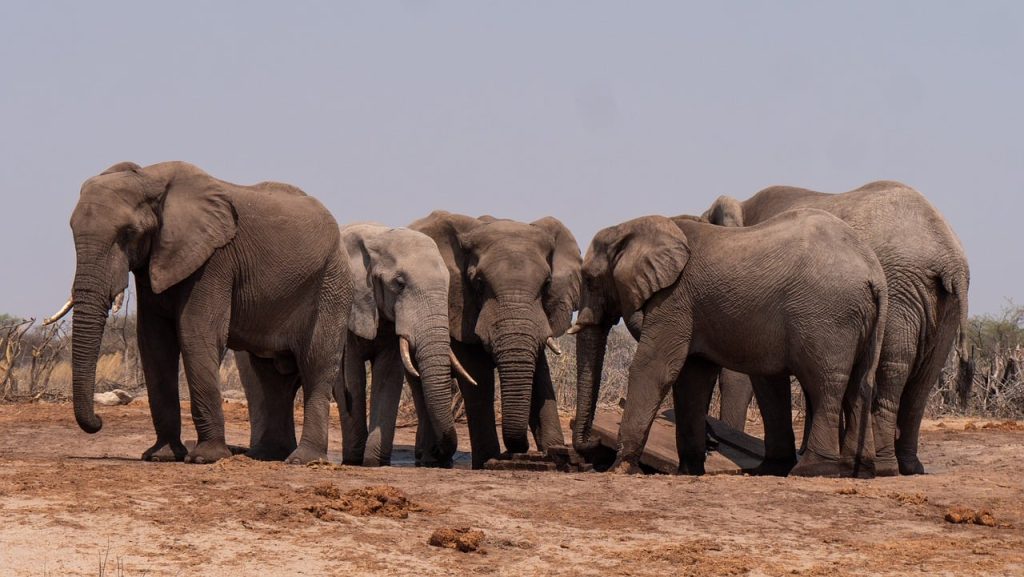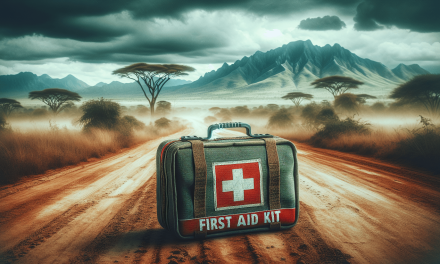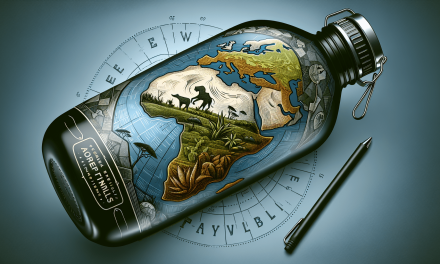Heading out on a thrilling safari adventure? Before you set off to witness the extraordinary wildlife and mesmerizing landscapes, make sure you have your packing game on point. The “Essential Safari Packing List: Don’t Forget These Items!” article is here to lend a helping hand. From sturdy walking shoes to bug repellent, this comprehensive guide is packed with all the must-have essentials to ensure your safari experience is nothing short of incredible. So, grab your trusty backpack and let’s get started on this wild journey together! Going on a safari is an exciting adventure that allows you to interact with nature and witness incredible wildlife. But before you embark on your journey, it’s important to pack the right clothing to ensure your comfort and safety throughout your trip. Here are some tips on what to wear during your safari:
Appropriate Clothing for Safari
When it comes to safari clothing, comfort and practicality should be your top priorities. Opt for lightweight, breathable fabrics such as cotton or linen to keep cool in warm weather. Long-sleeved shirts and pants are a must to protect yourself from the sun and pesky insect bites. Neutral earth tones like khaki, beige, or olive green are ideal for blending in with the surroundings and avoiding unnecessary attention from wildlife.
Layering for Different Weather Conditions
Safari destinations can experience varying weather conditions, so it’s important to pack layers that can be easily added or removed. Mornings and evenings can be chilly, so a lightweight jacket or sweater is essential. Additionally, pack a lightweight rain jacket for unexpected showers. Layering allows you to adapt to changing temperatures and ensures you stay comfortable throughout your safari.
Comfortable Walking Shoes
A safari often involves walking and exploring vast areas, so comfortable walking shoes are a must. Opt for closed-toe shoes with sturdy soles to protect your feet from rough terrain and potential hazards. Make sure to break in your shoes before your safari to avoid blisters and discomfort during your trip.
Hat and Sunglasses
Protecting yourself from the sun is crucial when on a safari. Pack a wide-brimmed hat to shield your face, ears, and neck from the sun’s rays. Sunglasses with UV protection are also essential to protect your eyes from harmful glare. Make sure to choose sunglasses with polarized lenses to reduce strain on your eyes and improve visibility.
Swimsuit and Cover-up
If your safari destination includes water activities or offers swimming opportunities, don’t forget to pack a swimsuit. A cover-up or sarong is also handy for lounging by the pool or drying off after a swim. Ensure your swimsuit and cover-up are lightweight and quick-drying for added convenience.
Sleepwear and Undergarments
Comfortable sleepwear is essential for a good night’s rest during your safari. Opt for lightweight and breathable materials, such as cotton, to keep cool in warm weather. Pack enough undergarments for the duration of your trip, keeping in mind that you may not have access to laundry facilities.
Lightweight Rain Jacket
Weather conditions can change quickly during a safari, and rain showers are not uncommon. Packing a lightweight rain jacket will ensure you stay dry and comfortable during unexpected downpours. Look for a jacket that is waterproof and breathable, allowing you to stay protected without feeling overheated.
Scarf or Bandana
A lightweight scarf or bandana is a versatile accessory that can come in handy during your safari. It can be used as a head wrap to protect your hair and scalp from the sun. It can also be worn around your neck to protect against dust and can even double as a face covering in dusty or windy conditions.
Now that we’ve covered the clothing essentials for your safari, let’s move on to the essential documents you’ll need to bring along:
Valid Passport
Before embarking on your safari, ensure that your passport is valid for at least six months beyond your planned departure date. It’s also a good idea to make copies of your passport and keep them in a separate location in case of loss or theft.
Visa Documents
Depending on your destination, you may need a visa to enter the country. Research the visa requirements well in advance and make sure to apply for it if necessary. Keep the visa documents in a secure place, such as a passport holder, to avoid misplacing them.
Travel Insurance
Travel insurance is a crucial aspect of any trip, including safaris. It protects you against unexpected expenses such as medical emergencies, trip cancellations, or lost luggage. Ensure that your travel insurance policy provides adequate coverage for safari activities and wildlife encounters.
Immunization Records
Check with your healthcare provider or travel clinic to see if any vaccinations or preventive medications are recommended for your safari destination. Keep a record of your immunizations and carry them with you during your trip.
Emergency Contact Information
It’s important to have a list of emergency contact information readily available during your safari. Include the contact details of your travel agent, hotel, tour operator, and local embassy or consulate. Share this information with a loved one back home as well.
Copies of Important Documents
Make copies of important documents such as your passport, visa, travel insurance policy, and immunization records. Keep these copies separate from the originals and store them in a secure location, such as a hotel safe or a waterproof pouch. These copies will be invaluable in case you lose the originals.
Now that we’ve covered the essential documents, let’s move on to the electronics you should consider packing for your safari:
Camera and Extra Batteries
A safari offers incredible wildlife photography opportunities, so don’t forget to pack a good camera. Opt for a DSLR or a quality point-and-shoot camera with zoom capabilities. Remember to bring extra batteries and memory cards to ensure you never miss a shot.
Binoculars
Binoculars are an essential tool for spotting wildlife in the distance. Look for binoculars with a magnification of at least 8x or 10x and a wide field of view. Compact and lightweight binoculars are ideal for travel and can be easily carried in a daypack.

Power Adapter and Converter
Before you travel, research the power outlets and voltage requirements of your safari destination. Carry a power adapter and converter to charge your electronic devices safely. Remember to check if your accommodation provides universal outlets or if you need a specific adapter.
Cell Phone and Charger
Even if you plan to disconnect from the outside world during your safari, it’s still a good idea to bring your cell phone for emergencies or photography purposes. Make sure to pack a charger and consider bringing a portable charger for extra convenience.
Portable Charger
A portable charger is a lifesaver when you’re out in the wilderness without access to power outlets. It allows you to recharge your devices on the go and ensures you never miss capturing those unforgettable safari moments.
Headlamp or Flashlight
A headlamp or flashlight is a handy accessory for safaris, especially if you’re planning any nighttime activities or camping. Choose a headlamp with adjustable brightness levels and a long battery life to navigate in the dark.
Next, let’s move on to toiletries – the essential items you’ll need for personal hygiene during your safari:
Toothbrush and Toothpaste
Maintaining proper oral hygiene is important even during a safari. Pack a travel-sized toothbrush and toothpaste to keep your teeth clean and fresh throughout your trip.
Shampoo and Conditioner
Opt for travel-sized bottles of shampoo and conditioner to keep your hair clean and manageable. Look for products that are gentle on the hair and scalp and environmentally friendly.
Soap or Body Wash
Choose a mild soap or body wash that is eco-friendly and suitable for sensitive skin. Look for biodegradable options to minimize your impact on the environment.
Deodorant
Staying fresh and odor-free is important, especially in warm weather. Choose a travel-sized deodorant that is long-lasting and non-irritating.
Sunscreen and Insect Repellent
Protecting your skin from the sun’s harmful rays is crucial during a safari. Pack a high SPF sunscreen and apply it liberally throughout the day. In addition, bring a reliable insect repellent to keep pesky bugs at bay.
Feminine Hygiene Products
If you require feminine hygiene products, make sure to pack an ample supply for the duration of your safari. These may not be readily available in remote areas.
Medications and First Aid Kit
If you take any prescription medications, ensure you have an adequate supply for the entire trip. Bring along a basic first aid kit that includes items like adhesive bandages, antiseptic ointment, painkillers, and any necessary medications for common ailments.
Now, let’s move on to the miscellaneous items that can enhance your safari experience:
Money and Credit Cards
Ensure you have enough cash in the local currency for small expenses and emergencies. Carry a mix of cash and credit cards to have multiple payment options. It’s also a good idea to inform your bank of your travel plans to avoid any issues with card usage.
Guidebooks and Maps
Guidebooks and maps can provide valuable information about the safari destination, including wildlife, cultural insights, and maps of the area. Choose a guidebook that focuses on your specific destination to make the most of your safari experience.
Reusable Water Bottle
Staying hydrated is crucial during a safari, so pack a reusable water bottle. Look for a bottle that is lightweight and durable, and consider one with built-in filtration for added convenience.
Snacks and Water
Carry non-perishable snacks such as energy bars, dried fruits, and nuts to keep you fueled between meals. It’s also a good idea to pack a refillable water bottle and carry enough water to stay hydrated throughout the day.
Ziplock Bags
Ziplock bags are incredibly versatile and can be useful in countless situations during your safari. They can keep your electronics and important documents dry, store snacks, or compartmentalize small items.

Travel Pillow and Blanket
If you’re traveling long distances or planning to camp, a travel pillow and blanket can provide much-needed comfort and rest. Look for compact and lightweight options that can easily fit in your daypack.
Laundry Bag
A laundry bag is a practical item for keeping your clean and dirty clothes separate during your safari. Consider a lightweight and compressible bag that won’t take up much space in your luggage.
Travel Locks
Protect your belongings and give yourself peace of mind by utilizing travel locks. Lock your suitcases and daypacks when leaving them unattended, especially in shared spaces or during transfers.
Binocular and Camera Straps
Safaris involve a lot of movement, so it’s important to secure your binoculars and camera to prevent accidents or loss. Invest in comfortable and adjustable straps to keep your gear safe and readily accessible.
Daypack or Bag
A lightweight daypack or bag is essential for carrying your essentials during game drives or walks. Look for a bag with multiple compartments and comfortable straps for easy access and comfort.
Now, let’s move on to the outdoor gear you should consider packing for your safari:
Binoculars
Binoculars are an essential tool for spotting wildlife in the distance. Look for binoculars with a magnification of at least 8x or 10x and a wide field of view. Compact and lightweight binoculars are ideal for travel and can be easily carried in a daypack.
Camera and Extra Batteries
A safari offers incredible wildlife photography opportunities, so don’t forget to pack a good camera. Opt for a DSLR or a quality point-and-shoot camera with zoom capabilities. Remember to bring extra batteries and memory cards to ensure you never miss a shot.
Safari Hat
A safari hat is a stylish and practical accessory to protect your head and face from the sun. Look for a hat with a wide brim and ventilation holes to keep you cool and shaded.
Sunscreen and Lip Balm
Protecting your skin from the sun’s harmful rays is crucial during a safari. Pack a high SPF sunscreen and apply it liberally throughout the day. Don’t forget to protect your lips with a lip balm that contains SPF.
Insect Repellent
Insect bites can be a nuisance and potentially transmit diseases. Pack an effective insect repellent and apply it to exposed skin to keep bugs at bay.
Comfortable Backpack
A comfortable backpack is essential for carrying your essentials during game drives or walks. Look for a lightweight backpack with padded straps and multiple compartments for organized storage.
Walking Stick
If you require extra support while walking or hiking, consider packing a walking stick. A collapsible walking stick is ideal for travel as it can easily fit in your backpack when not in use.
Compass and GPS
Navigation tools such as a compass and GPS can come in handy during safaris, especially if you’re venturing off the beaten path. Familiarize yourself with their usage and carry them in case you need assistance with directions.
Pocket Knife
A pocket knife is a versatile tool that can be useful for various purposes during your safari. Look for a compact and multi-functional option that includes features like a blade, screwdriver, and bottle opener.
Next, let’s move on to medical supplies – items that can ensure your health and well-being during the safari:
Prescription Medications
If you take any prescription medications, ensure you have an ample supply for the duration of your safari. It’s also a good idea to carry a prescription letter or a copy of your prescription in case you need to refill your medications abroad.
Painkillers and Fever Reducers
Pack a small supply of over-the-counter painkillers such as ibuprofen or acetaminophen. These can provide relief for headaches, muscle aches, or fever that you may experience during your safari.

Antihistamines
Allergies or bug bites can sometimes occur during a safari. Carry antihistamines such as Benadryl to alleviate any allergic reactions or itching.
Anti-Diarrheal Medication
Safaris can involve trying new foods or drinking unfamiliar water, which may upset your stomach. Pack anti-diarrheal medication to alleviate any digestive issues that may arise.
Antibiotic Ointment
In case of minor cuts, scrapes, or insect bites, antibiotic ointment can help prevent infection. Carry a small tube and apply it to any wounds as needed.
Adhesive Bandages
Pack a variety of adhesive bandages in different sizes to cover any cuts, blisters, or minor injuries. They can provide protection and prevent further irritation or infection.
Water Purification Tablets
If you’re unsure about the quality of the water at your safari destination, carrying water purification tablets is a wise precautionary measure. They can help purify water from potentially unsafe sources and provide you with safe drinking water.
Now, let’s move on to travel accessories – items that can enhance your comfort and convenience during your safari:
Neck Pillow
A neck pillow is a travel essential for long journeys or flights. It provides support and comfort, allowing you to rest and sleep more comfortably.
Eye Mask
An eye mask can be a lifesaver when you need to block out light and get some quality sleep, especially if you’re staying in accommodations with bright lighting or when traveling in areas with longer daylight hours.
Earplugs
Whether it’s to drown out noisy fellow travelers or to get a good night’s sleep in unfamiliar surroundings, earplugs are a must-have accessory. Carry a pair or two to ensure uninterrupted peace and quiet.
Hand Sanitizer
Keeping your hands clean is crucial, especially when you’re in a remote or wilderness area. Carry a travel-sized hand sanitizer and use it regularly, particularly before meals or after touching surfaces.
Travel-Sized Toiletries
Travel-sized toiletries are ideal for minimizing weight and space in your luggage. Look for mini-sized versions of your favorite shampoo, conditioner, body wash, and other personal care items.
Travel Adapters
Different countries have different power outlets, so carrying a travel adapter ensures you can charge your electronic devices without any issues. Look for an adapter that is compatible with your destination’s outlets.
Travel-Size Laundry Detergent
If you plan on doing laundry during your safari, pack a travel-size laundry detergent. This can come in handy for spot cleaning clothes or doing laundry in sinks or tubs.
Travel Documents Organizer
Keep your travel documents, such as passports, visas, flight tickets, and accommodation details, organized and easily accessible. A travel documents organizer or a zippered folder can help you stay organized and minimize the chances of misplacing important paperwork.
Travel Cord Organizer
Carrying multiple electronic devices means dealing with multiple cords. A travel cord organizer will keep your cords tangle-free and organized, making it easier to find the right cord when you need it.
Reusable Shopping Bag
A reusable shopping bag is a versatile accessory to have during your safari. It can be used to carry groceries, souvenirs, or even as a day bag. Look for a compact and foldable option that doesn’t take up much space in your luggage.
Now, let’s move on to entertainment – items that can keep you entertained during downtime:
Books or E-Reader
Whether you prefer a physical book or an e-reader, having something to read during downtime can be enjoyable. Choose books or e-books that align with your interests, whether it’s wildlife, adventure, or fiction.
Journal and Pen
A safari can be a transformative experience, and keeping a journal allows you to capture your thoughts, feelings, and memorable moments. Pack a journal and pen to record your daily experiences and reflect on your safari adventure.
Playing Cards or Travel Games
Playing cards or small travel games are excellent entertainment options during downtime or when traveling with others. They are compact, lightweight, and can provide hours of fun.
Music Player and Headphones
If you enjoy listening to music, don’t forget to pack your music player and a pair of headphones. Music can set the mood, enhance relaxation, and provide entertainment during long journeys.
Binoculars for Bird Watching
If you have a specific interest in birdwatching, it’s worth packing a separate pair of lightweight binoculars specifically for this purpose. Birdwatching can be a rewarding activity during a safari, allowing you to appreciate the incredible diversity of avian species.
Lastly, let’s talk about food and snacks – items to keep you fueled and satisfied during your safari:
Non-Perishable Snacks
Carry a variety of non-perishable snacks such as granola bars, trail mix, or dried fruit. These snacks can provide quick energy boosts and help sustain you between meals.
Energy Bars
Energy bars are a convenient and nutritious snack that can be easily packed and carried during your safari. Choose bars with a balanced mix of carbohydrates, protein, and healthy fats to keep you energized throughout the day.
Dried Fruits and Nuts
Dried fruits and nuts are lightweight, compact, and provide a good source of nutrients and energy. Pack a mix of your favorite dried fruits and nuts to snack on during your safari adventures.
Now that you have a comprehensive packing list for your safari, you can feel confident that you have everything you need to make the most of your adventure. Remember to double-check the specific requirements and recommendations for your particular destination and tailor your packing list accordingly. With the right clothing, essential documents, electronics, toiletries, miscellaneous items, outdoor gear, medical supplies, travel accessories, entertainment, and food and snacks, you’ll be well-prepared for an unforgettable safari experience. Enjoy your safari!












